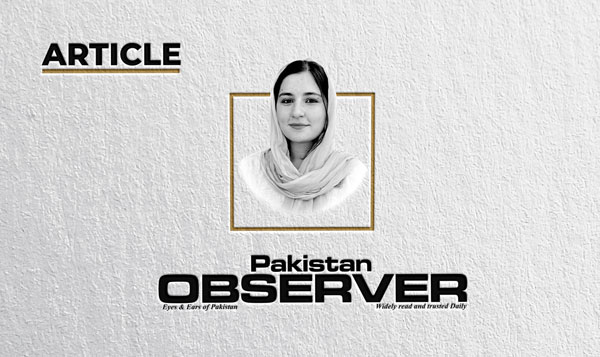Strengthened Pakistan through ‘Bajwa doctrine’
EVERY inch of the soil bears witness to the Pakistan Army’s contribution to fighting terrorism and other security threats that Pakistan has faced over the past three decades.
Prime Minister of Pakistan in 2015, Nawaz Sharif’s administration confronted internal militancy as the biggest threat. Furthermore, PML-N government’s neutral stance in the Yemen conflict created distance in Saudi-Pakistan relations.
Inflation stayed constant over this time at 7.9%. The decline in foreign demand caused a slowdown in manufacturing and industrial expansion. Tension between India and Pakistan intensified. Pakistan was deeply engaged in tackling both traditional and non-traditional security concerns.
General Qamar Bajwa took over as Pakistan’s 16th Chief of Army Staff on November 29, 2016, following General Raheel Sharif.
Due to Gen. Bajwa’s successful approach to international and domestic issues, the terminology and concept of a “Bajwa doctrine” received a lot of attention during his tenure. Doctrine means a concept, viewpoint or policy endorsed by an authority.
According to this claimed doctrine, Gen. Bajwa appears to have a broad vision of everything, from significant political issues to the economy and foreign affairs.
The Bajwa doctrine marked a radical departure from the “chauvinistic” approach of the previous more than 70 years in foreign policy.
During Gen Bajwa’s tenure, the Pakistan Military started “Operation Radd-ul-Fasaad” in February 2017.
The mission was carried out by Pakistan’s Army successfully in the wake of a significant rise in terrorist assaults in the country. Pakistan was able to launch China-Pakistan Economic Corridor (CPEC) with the success of this conventional military-led operation.
Pakistan became a peaceful nation by annihilating terrorists from Balochistan to Sindh. Since the operation’s outset six years ago, hundreds of terrorist hideouts have been dismantled by Pakistan Army.
The fence along the Pakistan-Afghanistan border began in June 2017, which has improved the security situation along the international border. Furthermore, Gen Bajwa’s tenure coincided with an increase in tension with India in 2019.
After the Pakistan Air Force on February 27 shot down two Indian aircraft for trespassing into Pakistani airspace, the situation between nuclear-armed Pakistan and India sparked concerns of an all-out conflict.
Gen. Bajwa displayed the Pakistan Army’s readiness to repel any Indian misadventure or assault. The Bajwa doctrine discussed the Kashmir issue vehemently as we have ever seen it.
Gen. Bajwa played his cards so wisely that the global superpower had to acknowledge Pakistan’s importance, and the US requested our assistance in this Afghan conflict.
America had to enlist Pakistan’s assistance to withdraw from Afghanistan, and this was only because of Gen. Bajwa’s vision.It was impressive how Gen Bajwa handled regional traditional security challenges. From Kashmir to Afghanistan, the Pakistani military demonstrated its will and commitment to eliminate any threat to Pakistan’s security.
The Bajwa Doctrine’s crowning success on the Pakistan-Afghanistan border fence will benefit both nations. The Bajwa doctrine has always been ready for amicable dialogue with India for regional peace, but without making concessions over the Kashmir dispute.
His chief concern tends to be political economy mishandling, which has pushed Pakistan to the verge of bankruptcy.
We can see from the Bajwa doctrine’s second phase that he focused increased significance on non-traditional security to support Pakistan’s security and sovereignty objectives, regional peace, and stability.
The army chief also met with some of Pakistan’s most influential entrepreneurs. According to reports, Bajwa discussed at a meeting of entrepreneurs that the better internal security situation in Pakistan has opened space for increasing economic activity.
The Bajwa Doctrine intended to re-establish Iran and Afghanistan as its former allies while pursuing peace along western frontiers.
Gen. Bajwa tried to repair the close ties with Saudi Arabia, Qatar and the United States. The Bajwa Doctrine directed Pakistan’s foreign policy to shift from a “geographic tilt” to a “geo-economic” one.
Pakistan is given sole importance in the Bajwa doctrine. The doctrine has tackled terrorism of all stripes. The goal of Gen. Bajwa and his group is to eradicate violence in Pakistan and create a nation that is peaceful and affluent.
He is extroverted, grounded in life’s reality and motivated to take appropriate action to address problems.
The General himself is a good listener and values reasoned deliberation. When interacting with others, he is kind and shows a passionate and devoted interest in fundamental human bonds.
However, since holding the post that is considered the most powerful in Pakistan, Gen. Qamar Javed Bajwa has proven that he is a man with true leadership characteristics, whether it be on the diplomatic front or through military policy. Any doctrine’s effectiveness is determined by actions, not by intentions.
The current situation calls for strengthening the political and economic system, protecting Pakistan from foreign threats, and changing the fictitious state narrative to reflect reality.
At this point, Pakistan needs a General with even higher expectations attributable to his competence and clearer view.
—The writer is currently working as Research Associate at Institute of Peace and Contemporary Affairs, Islamabad.










